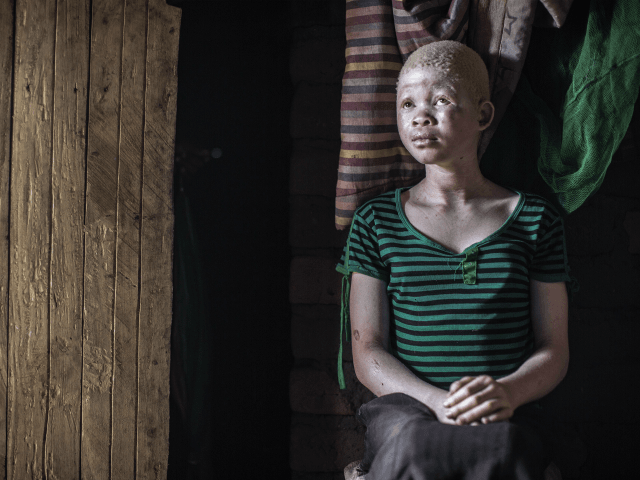A minority party politician in Malawi reignited the debate regarding the use of the death penalty in the African country, Malawi’s Nyasa Times reported Tuesday, calling for the execution of killers targeting albino people to sell their body parts on the black market.
In Malawi, Tanzania, and other parts of southern Africa, the belief persists that people with albinism possess magical powers. Traditional herbalists and healers will often pay high prices for albino body parts to use in magic potions alleged to bring good fortune to the drinkers. Some also believe that engaging in sexual intercourse with someone with albinism can cure HIV/AIDS, a superstition that has fueled rape attacks against albino women and girls.
Investigations from the region have found that some witch doctors will pay up to $75,000 for albino bodies. Given how expensive the ingredients for these magic potions can be, customers are often wealthy individuals and politicians, presenting a significant enforcement problem for local governments.
Tanzania criminalized all witchcraft in 2015.
Malawi, meanwhile, had to contend with increased demand for albino body parts in light of its neighbor’s ban.
“This is a difficult issue. It is not right for a person to be killing other people just like that and these cases have been left for too long without finding the real killers and without any convictions while people with smaller crimes get stiff sentences,” Ulia Kaunda, a local Chibanja politician for the minority United Democratic Front (UDF), said during a debate on Friday. “I will protect all people with albinism in Chibanja, when I am elected. I will also meet the Member of Parliament and ask him to push for the death penalty on anyone who kills an albino.”
Malawi allows for capital punishment in its laws but has not executed a convict since 1992 and faces significant pressure from the international community to abolish the death penalty. Police have ordered officers to shoot first in cases that appear to be albino abductions, but the courts have not followed suit. On the contrary, albino murder cases can often take months to process as police struggle to round up suspects, both killers and potential buyers. In one case, for example – the murder of Macdonald Masambuka, police had arrested 12 people by April 2018, a month after investigators found Masambuka’s body. Among the suspects was a Catholic priest, Father Thomas Muhosha.
Last year, President Peter Mutharika announced that he would look into bringing back the death penalty for individuals found guilty of killing albinos or hacking attacks against them. Some assailants, rather than kill albinos, choose to attempt to hack their limbs off so as to not end their lives but also have something to sell to local healers. Mutharika faced significant resistance from tribal leaders, 94 percent of which opposed capital punishment in general according to a survey at the time.
In January, following the murder of Yasin Phiri, a man with albinism, on New Year’s Eve, Mutharika urged the nation to refrain from the killings and cease believing that albino body parts could improve their lives if cooked into a potion. The assailants in the Phiri case chopped off his hands and left him to bleed to death in front of his nine-year-old son.
“I want to say it here that we should stop attacking our friends with albinism,” Mutharika said at the time. “It is ignorance to think that you can get rich if you have a body part of a person living with albinism. We have over 10 albinos that have been killed in this country and how many of those killers have become rich? Let us stop such childish and barbaric thinking.”
By the end of February, the government had documented six cases of albino murders. Officials vowed to combat the spread of violence against people with albinism by establishing better census statistics of how many albino people live in the country to better confirm when people go missing, as well as establishing programs to help survivors of albino attacks reintegrate into society and overcome trauma.
On Monday, Malawi Eastern Region Police Commissioner Arlene Baluwa claimed that the number of cases of albino attacks had gone down in what had transpired of 2019, at least in that part of the country.
“Our region, especially in districts such as Mangochi and Machinga, used to register a lot of cases of abduction and killing targeting people with albinism,” Baluwa said. “However, we seem to be making progress. Last year, we registered a single case, thanks to the good working relationship with traditional leaders, proper coordination among police personnel as well as the understanding of our friends with albinism.”

COMMENTS
Please let us know if you're having issues with commenting.